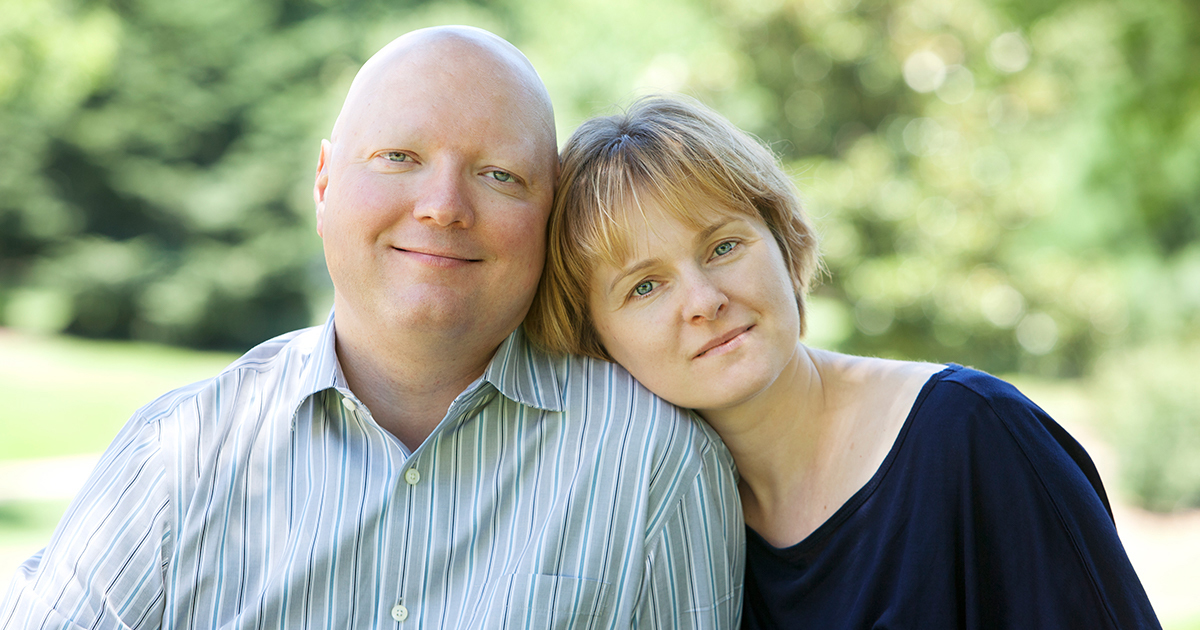About Non-Hodgkin Lymphoma
Non-Hodgkin lymphoma (NHL) is a blood cancer of your lymphatic system. Made up of a type of white blood cells called lymphocytes, the lymphatic system is part of your immune system, which helps fight infections and other diseases. There are two main types of lymphocytes: B lymphocytes (B cells) and T lymphocytes (T cells). In non-Hodgkin lymphoma, the lymphocytes begin to multiply uncontrollably, producing abnormal cells that invade lymphoid tissue throughout the body. Non-Hodgkin lymphoma can arise from either T lymphocytes or B lymphocytes.
The major sites of lymphoid tissue are:
- Adenoids and tonsils
- Bone marrow
- Digestive tract, including the stomach and intestines
- Lymph nodes found throughout the body, including inside the chest, abdomen (belly), and pelvis
- Lymph vessels
- Spleen
- Thymus gland
Over 77,000 patients per year are diagnosed with non-Hodgkin lymphoma in the United States. Hodgkin lymphoma, another major form of lymphatic cancer characterized by the presence of abnormal B cells known as Reed-Sternberg cells, is less common.
Types of Non-Hodgkin Lymphoma
Non-Hodgkin lymphoma types are categorized based on whether the cancer involves B cells, T cells, or natural killer (NK) cells. Some forms of the condition are aggressive, meaning they progress quickly, while slower forms of non-Hodgkin lymphoma are known as indolent lymphomas.
B cell lymphomas include:
- Burkitt lymphoma: An aggressive form of NHL associated with rapidly growing tumors.
- Cutaneous B cell lymphoma: A form of skin lymphoma that tends to affect only a couple parts of the body.
- Chronic lymphocytic leukemia: An indolent form of NHL that accounts for most leukemia cases among adults in Western countries. CLL is closely related to small lymphocytic lymphoma and is characterized by the gradual accumulation of immature white blood cells in the blood and bone marrow.
- Hairy cell leukemia (HCL): A rare subtype of chronic lymphocytic leukemia linked to a different form of B lymphocyte than the former condition.
- Diffuse large B cell lymphoma (DLBCL): A common and aggressive form of NHL in which the malignant cells are spread out throughout the body.
- Follicular lymphoma: The most common form of indolent NHL.
- Lymphoplasmacytic lymphoma (Waldenström macroglobulinemia): An indolent form of NHL that also affects the plasma cells implicated in multiple myeloma.
- Mantle cell lymphoma (MCL): A form of NHL with similarities to both aggressive and indolent forms of the condition.
- Marginal zone lymphoma: A common indolent form of NHL named for its origins in the marginal zones, specific regions of lymph tissue.
- Primary central nervous system lymphoma: A form of NHL that may cause headaches, fatigue, seizures, or spinal cord symptoms.
- Richter’s syndrome: A rare form of NHL that develops as a complication of chronic lymphocytic leukemia.
- Small lymphocytic lymphoma (SLL): An indolent form of NHL closely related to chronic lymphocytic leukemia and characterized by the gradual accumulation of immature lymphocytes primarily in the lymph nodes.
T and NK cell lymphomas include:
- Anaplastic large cell lymphoma (ALCL): This aggressive form of NHL can either affect the whole body (systemic ALCL), the skin only (primary cutaneous ALCL), or tissue surrounding breast implants (breast implant-associated ALCL).
- Angioimmunoblastic T-cell lymphoma (AITL): A rare and aggressive form of NHL that typically affects older adults.
- T-cell lymphoblastic lymphoma (T-LBL)/ T-cell acute lymphoblastic leukemia (T-ALL): Two closely related forms of NHL which are associated with respiratory distress.
- Cutaneous T-cell lymphoma (CTCL): A form of skin lymphoma that causes red, itchy patches of skin on multiple parts of the body.
- Enteropathy-associated intestinal T-cell lymphoma (EATL): A rare and aggressive form of NHL linked to celiac disease.
- Extranodal natural killer (NK) T-cell lymphoma: A form of NHL almost always caused by Epstein-Barr virus infection with symptoms concentrated in the nasal passages.
Symptoms of Non-Hodgkin Lymphoma
Different forms of non-Hodgkin lymphoma are associated with different symptoms.
Symptoms of non-Hodgkin lymphoma may include:
- Abdominal pain or swelling
- A feeling of fullness after a small amount of food
- Coughing, trouble breathing, or chest pain
- Easy bruising or bleeding
- Fever without infection
- Night sweats
- Severe or frequent infections
- Painless swelling of lymph nodes in your neck, armpits, or groin
- Persistent fatigue
- Unintended weight loss
Fever, night sweats, and unintended weight loss of more than 10% of one’s body weight over a 6 month period are “B symptoms”, a group of symptoms that can help your doctor assess the status of your condition.
Risk Factors for Non-Hodgkin Lymphoma
Certain people are at greater risk of developing non-Hodgkin lymphoma. Different forms of the condition are linked to different risk factors.
Risk factors for non-Hodgkin lymphoma may include:
- Age: Non-Hodgkin lymphoma can occur at any age, but usually affects individuals over the age of 60.
- Family history: White patients are at higher risk for developing non-Hodgkin lymphoma.
- Health history: Non-Hodgkin lymphoma is associated with a weakened immune system, including from medical immunosuppression and autoimmune disease, Epstein-Barr virus or mononucleosis infection, HIV infection, radiation exposure, and breast implants.
- Sex: Men are more likely to be diagnosed with non-Hodgkin lymphoma than women.
Treating Non-Hodgkin Lymphoma at UT Health Austin
Treatment will require an accurate diagnosis and depend on specific type of lymphoma, location of cancer, and stage of disease. Your care team will work with you to develop a treatment plan tailored to your individual needs. Treatment options may include a combination of radiation therapy, immunotherapy, chemotherapy, and/or stem cell transplant.
Care Team Approach
At UT Health Austin, we take a multidisciplinary approach to your care. This means you will benefit from the expertise of multiple specialists across a variety of disciplines caring for you in one place to avoid having to schedule multiple appointments with providers at locations all over the city. The Livestrong Cancer Institutes care team includes medical oncologists, surgical oncologists, radiation oncologists, pathologists, radiologists, oncofertility specialists, onco-psychiatrists, genetic counselors, physical therapists, dietitians, social workers, and more as well as other members of the CaLM Care Team who work together to help you get back to the things in your life that matter most to you.
We collaborate with our colleagues at the Dell Medical School and The University of Texas at Austin to utilize the latest research, diagnostic, and treatment techniques, allowing us to provide you with state-of-the-art care. We call our approach to cancer care CaLM (Cancer Life reiMagined), and your treatment begins with a comprehensive, whole-person assessment that your care team will use to develop a personalized care plan to treat your condition and help restore your wellness. The CaLM approach also includes coordinated, whole-person services, such as relaxation and stress reduction strategies, nutritional guidance, financial planning, and emotional support, that can make a real difference for you and your family. Advanced imaging and lab testing are also available on-site if needed.
Learn More About Your Care Team

Hematologic Malignancies
Health Transformation Building, 8th Floor
1601 Trinity Street, Bldg. A, Austin, TX 78712
1-833-UT-CARES (1-833-882-2737)
Get Directions

Livestrong Cancer Institutes
Health Transformation Building, 8th Floor
1601 Trinity Street, Bldg. A, Austin, TX 78712
1-833-UT-CARES (1-833-882-2737)
Get Directions